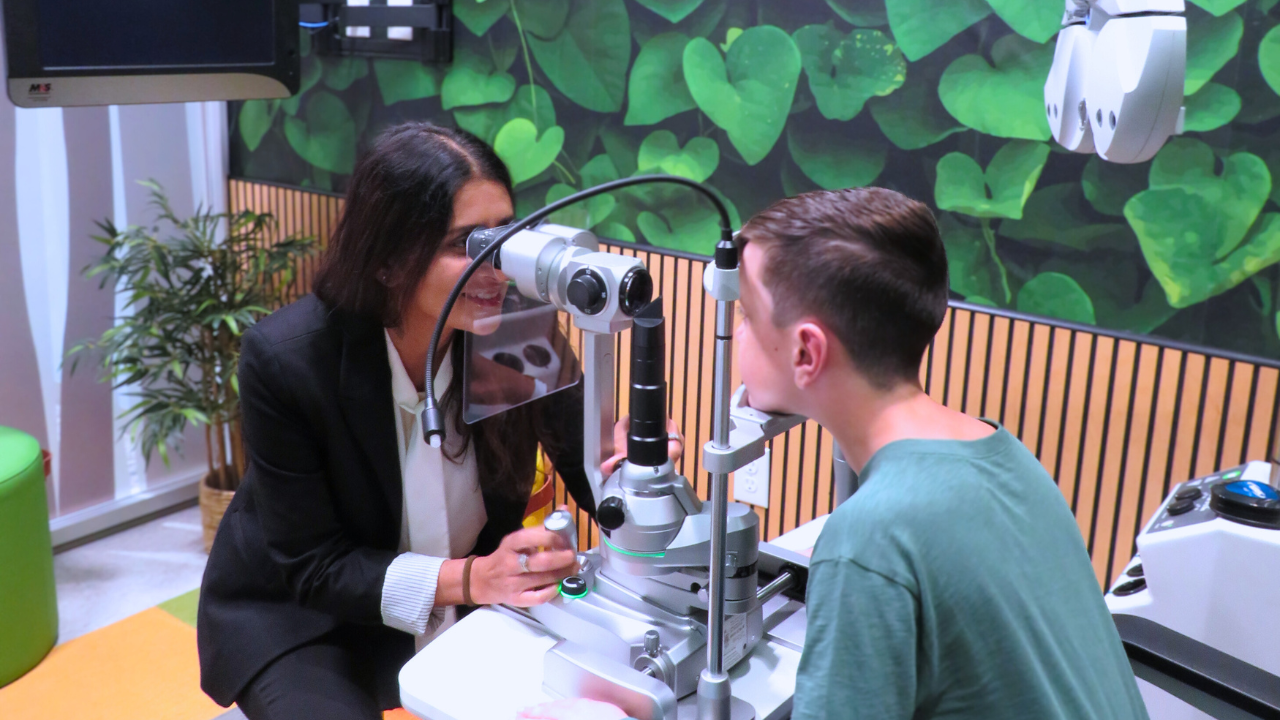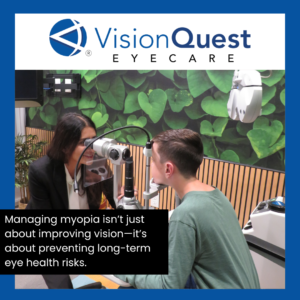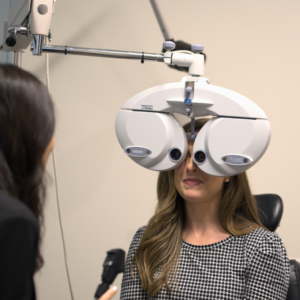If your child’s nearsightedness (myopia) worsens each year, it’s important to take action early. Myopia is not just about needing stronger glasses—unchecked, it can increase the risk of serious eye conditions later in life, such as glaucoma and retinal detachment. Fortunately, advances in myopia management allow us to slow or even stop its progression, protecting your child’s vision for the future.
At VisionQuest Eyecare, we specialize in state-of-the-art myopia treatments tailored to each patient. Based on extensive research and clinical evidence, here are the most effective ways to manage and treat myopia in children.
Understanding Myopia: Why Does It Happen?
Myopia occurs when the eyeball grows too long from front to back, causing light to focus in front of the retina rather than directly on it. This leads to blurry distance vision while near objects remain clear. The primary cause of myopia progression is the continued elongation of the eyeball, which is why effective treatments focus on slowing this growth.
Several factors contribute to myopia, including genetics, excessive screen time, and insufficient outdoor activity. While traditional glasses correct vision, they do not address the underlying progression of the condition. That’s why specialized myopia treatments are essential for long-term eye health.
Four Proven Treatments for Managing Myopia
At VisionQuest Eyecare, we offer several advanced options to slow myopia progression and reduce the need for stronger prescriptions over time. The best treatment will depend on your child’s age, lifestyle, and individual eye health.
1. Orthokeratology (Overnight Contact Lenses)
Orthokeratology (Ortho-K) uses specially designed overnight contact lenses that gently reshape the cornea while your child sleeps. When removed in the morning, these lenses provide clear vision all day without glasses or daytime contacts.
Beyond vision correction, Ortho-K has been shown to significantly slow myopia progression by altering how light is focused on the retina. This treatment is ideal for children and teenagers who want freedom from glasses during the day while actively preventing their myopia from worsening.
2. Prescription Atropine Eye Drops
Atropine eye drops have been used in eye care for years, but recent research has confirmed their effectiveness in slowing myopia progression. Applied once a night, low-dose atropine reduces the eye’s growth signals, helping to control myopia’s advancement.
This treatment is particularly beneficial for younger children or those not ready for contact lenses. It is often combined with other myopia management strategies for enhanced results.
3. Soft Multifocal Contact Lenses
Unlike standard contact lenses that only correct vision, specialized soft multifocal lenses have been designed to actively slow myopia progression. Brands like MiSight® 1 day have been FDA-approved and shown to reduce myopia progression by nearly 60%.
These lenses create a unique optical focus that signals the eye to slow its elongation, making them a convenient daytime alternative to Ortho-K for children comfortable wearing contact lenses.
4. Myopia-Control Glasses
For children who are not ready for contact lenses or eye drops, new advancements in myopia-control eyeglasses provide a promising alternative. These glasses use specially designed lens technology to redirect light similarly to Ortho-K and multifocal contact lenses.
While this option is still developing, early research suggests that specialized lenses may help slow myopia progression. This makes them a great choice for younger children or those with sensitivities to contact lenses.
Why Early Myopia Treatment Matters
Managing myopia isn’t just about improving vision—it’s about preventing long-term eye health risks. Severe myopia increases the likelihood of serious conditions such as:
- Glaucoma – Higher eye pressure that can damage the optic nerve.
- Retinal Detachment – A sight-threatening emergency where the retina pulls away from the eye.
- Early Cataracts – Clouding of the eye’s natural lens, affecting vision at a younger age.
By starting treatment early, you can protect your child’s vision and reduce their risk of future eye disease.
VisionQuest Eyecare: Personalized Myopia Management for Your Child
At VisionQuest Eyecare, we use advanced diagnostic technology to track myopia progression and develop a customized treatment plan for your child. Our Treehouse Vision System®—a scientifically backed approach to myopia management—has been shown to reduce myopia progression by up to 78%.
If your child’s vision is worsening, now is the time to take action. Schedule a myopia consultation today and give your child the best chance at lifelong healthy vision.

Dr. Chris Browning is a Greenwood native, who has been serving the community through glaucoma care and myopia management. He studied at Indiana University Bloomington and the Indiana University School of Optometry. As he has severe nearsightedness himself, Dr. Browning is passionate about helping others to achieve excellent vision.



